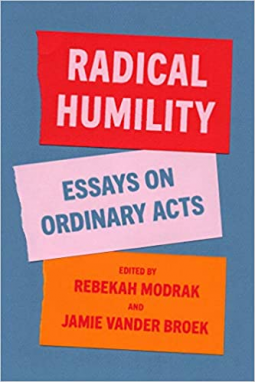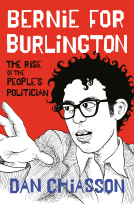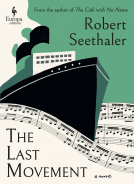
Radical Humility
Essays on Ordinary Acts
by Rebekah Modrak and Jamie Vander Broek
This title was previously available on NetGalley and is now archived.
Send NetGalley books directly to your Kindle or Kindle app
1
To read on a Kindle or Kindle app, please add kindle@netgalley.com as an approved email address to receive files in your Amazon account. Click here for step-by-step instructions.
2
Also find your Kindle email address within your Amazon account, and enter it here.
Pub Date Mar 16 2021 | Archive Date Mar 26 2021
Talking about this book? Use #RadicalHumility #NetGalley. More hashtag tips!
Description
This innovative essay collection explores the personal and civic function of humility from a range of popular and scholarly perspectives.
What does humility mean and why does it matter in an age of golden escalators and billionaire entrepreneurs? How can the cultivation of humility empower us to see success in failure, to fight against injustice, to stretch beyond our usual ways of thinking, and to foster a culture of listening in an age of digital shouting? With contributions from renowned scholars as well as psychologists, artists, and many others, Radical Humility: Essays on Ordinary Acts offers guidance. Having witnessed the personal and civic costs of narcissism and arrogance, these and other writers consider humility as a valuable process—a state of being—with the power to impact institutions, systems, families, and individuals, and give voice to the ways in which humility is practiced in many ordinary but extraordinary actions.
This groundbreaking collection should find a place in the library of anyone seeking alternatives to a culture of self-aggrandizing excess.
Contributors: Aaron Ahuvia, Russell Belk, Charles M. Blow, Richard C. Boothman, Agnes Callard, Lynette Clemetson, Tyler Denmead, Nadia Danienta, Mickey Duzyj, Kevin Em, Eranda Jayawickreme, Kevin Hamilton, Eranda Jayawickreme, Troy Jollimore, Melissa Koenig, Aric Rindfleisch, Valerie Tiberius, and Ami Walsh.
Available Editions
| EDITION | Other Format |
| ISBN | 9781948742962 |
| PRICE | $16.95 (USD) |
| PAGES | 176 |
Links
Average rating from 5 members
Featured Reviews
“Radical Humility” edited by artist and writer, Rebekah Modrak and Jamie Vander Broek, art librarian at the University of Michigan, is a “feel good” assemblage of essays penned by an eclectic agglomeration of authors. One common theme unifying these contributions is the notion of humility. Thus we have, among others, philosophers evoking the Socratic principle of humility in acknowledging the gaps in our knowledge, scholars extolling as “making failure”, the unfortunate efforts in 3D printing endeavours, and film makers reminding their viewers about the contributions made by “losers”, which at times even tower over the virtues of winners. Unlike the run of the mill self help books that specialise in flogging dead horses, yet professing the discovery of an earth shattering piece of wisdom or principle, “Radical Humility” leaves it all to the reader, preferring to just inform her on the advantages of being humble, by taking recourse to real life examples.
The book kicks off with an inspirational essay titled “Free yourself by choosing the plain crackers“ by Rebekah Modrak. Fleeing a stifling university culture in Ann Arbor, Modrak spends five weeks in the nondescript town of Aurora in Nebraska. Antithetical to the ubiquity of materialism, Aurora seems to be an exercise in minimalism. While the buzzword in the Ann Arbor was “visibility”, Aurora seems to revel in the concept of “anonymity.” Armed with a University Grant, Modrak embarks on a 5 week residency on a farm, as a part of which she conducts a series of interviews with the townsfolk. Carpenters, custodians, construction workers, senators and mayors alike patiently set out their views and silently glide out of the room with no care or concern for titles or epithets. Leading a life of absolute frugality, the people of Aurora value one tenet of human nature over all else, humility.
Philosopher Agnes Callard and poet Troy Jollimore, both draw parallels – in different essays – to Socrates and his mode of contemplating life to drive home the power of humility. History’s premier philosopher adopted a singularly unique method of passive interrogation, to supplement, and supplant both his as well as his interlocutor’s understanding on various aspects of human knowledge. The unfortunate yet privileged subjects of Socrates often found themselves in a state of “aporia”, or confusion, from which there was no retreat. And yet, after each episode, they all left the scene that much wiser. Jollimore in particular, highlights the perils that would emanate from harbouring a misguided notion that one’s opinion, even on complex matters trumps that of those around them. In fact, in a 2015 poll conducted in the United States, more than thirty percent of Republican Primary voters and almost twenty percent of their Democratic counterparts confidently reiterated their support for a bombing of Agrabah. Agrabah, by the way is the fictional nation that is the creation of Disney in their animated film, Aladdin.
In a profoundly moving piece, Richard C. Boothman, former trial lawyer and current Chief Risk Officer for the University of Michigan Health System, explains the importance of and pre-requisite for humility in the healthcare system on the part of both care givers and patients. Highlighting two tragic cases, Boothman underscores the invaluable power and potential of humility to not just forgive, but to heal as well. Lamenting the “deny and defend” culture that has permeated the world of medical care, Boothman bemoans the fact that healthcare has constructed a fortress with its own waiting rooms, its own language and an inimitable social system that encourages usage of buzz words such as “patient engagement.” Ushering in a radical change, Boothman and the University of Michigan decided to bare their hearts and souls to the patients and admit to inadvertent human errors that had calamitous consequences to not just the patients, but their families as well. This astonishingly benevolent decision however created immense backlash, as Boothman informs his reader. While the President of the American Medical Association lampooned Boothman’s actions as “reckless”, a group of famous scholars called the approach, “an improbable risk management strategy.” Monumental testimony to the altruistic strides which healthcare yet has to take.
Lynette Clemetson, Director of Wallace House, University of Michigan, in her essay, “Journalism in an era of likes, follows, and shares” underscores the need for unobtrusiveness in a reporter that would lend an element of humility and dignity to his/her work. Drawing inspiration from legends in the business such as Steven Strasser, David Fahrenthold, Gwen Ifil, Michele Norris, Robin Toner and Michel Martin, Clemetson emphasizes the need to be humble and yet hold on to what one values in an uncompromising manner. “Don’t get in the way of your story”, “Hold onto what you value”, and “check the small details” are her key takeaways.
In a shot, albeit powerful contribution, Mickey Duzyj, the creator of the Netflix documentary series, ‘Losers’, highlights the precocious contributions that are made by athletes who in their own sporting career suffered meltdowns at various stages that ensured that success forever eluded them. French golfer Jean Van De Velde, made a capital meal of his chances at the 1999 Open, thereby covering himself in perpetual infamy. However, banishing this bitter memory away, he championed a more noble cause, and in the process raising hundreds of thousands of dollars for impoverished children in the capacity of a UNICEF Ambassador. Similarly, Surya Bonaly, a black figure skater became an outcast following her tantrums after finishing second in the 1994 World Championships. Now a paragon of humility, Bonaly dons the mantle of a mentor by taking charge of young athletes of colour. She always warns her students that an “obsession towards medals can destroy them.”
“Radical Humiliation” is a modest, unpretentious and honest collection of simple thoughts all of which converge towards one overarching principle. Inculcating and implementing the quality of humility. As Russell Belk, the Kraft Foods Canada Chair in Marketing, and York University Distinguished Research Professor, says in his essay, “humility is largely voluntary; humiliation is largely involuntary. Humility is a choice made with dignity. Humiliation is imposed from without as a result of callousness and prejudice.”
We agree!
(Radical Humility will be released by Belt Publishing on the 16th of March, 2021)
Readers who liked this book also liked:
Marie Bostwick
Historical Fiction, Literary Fiction, Women's Fiction






